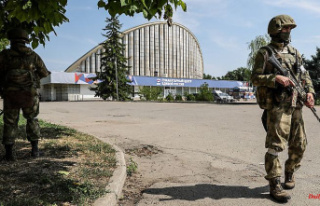According to Defense Minister Lambrecht, the special forces command has changed noticeably and numerous reforms have been implemented. That is why she expresses her fullest confidence in the controversial elite association of the army. She calls her educational work strategically important.
Defense Minister Christine Lambrecht has expressed her "full confidence" in the Special Forces Command after the reform process ordered because of right-wing extremist incidents. "There were 60 measures in this reform process that were to be implemented, and that was done," said the minister on her first visit to the association's barracks in Calw (Baden-Württemberg). Irregularities in the handling of ammunition and mistakes in the management culture were also corrected. Lambrecht said: "I can express my complete trust in the women and men here at the KSK." The SPD chairwoman Saskia Esken, who lives in Calw, was also present at the visit.
The KSK is the army's elite association for the liberation of hostages abroad, but also for possible use in national and alliance defense. Lambrecht emphasized the importance of this task in view of the changed security situation in Europe due to the Russian attack on Ukraine. "It is often very important to get key information so early that I can then focus on it and take the appropriate countermeasures," she said, referring to the special reconnaissance that the KSK can provide. "And it is important that certain targets of strategic importance can also be recorded and then switched off accordingly. These are both options that the KSK has, for example."
In response to a question, Lambrecht warned Russia against going down the path of nuclear escalation. Moscow's claim that Ukraine is preparing to use a so-called dirty bomb is outrageous and there is "zero evidence" for it. Dirty bombs are explosive devices that spread nuclear material in the air via a conventional explosion, but are therefore not atomic bombs.
"We have to take every threat of nuclear weapons seriously. And we take them very seriously, both in Germany and in NATO," said Lambrecht. Changes - including in Russian exercise scenarios - would be closely monitored. This has no impact on support for Ukraine. "It is very clear that we also express unanimously that the use of such nuclear weapons, such dirty weapons as they are called, would be crossing red lines."
At the Graf Zeppelin barracks in Calw, Lambrecht also met the KSK commander, Brigadier General Ansgar Meyer, who had taken over the leadership in Calw, having previously been the last commander of the Bundeswehr in Afghanistan. The KSK has around 1,400 posts, which also include the support forces for the commandos. Lambrecht visited the association's shooting training center, where soldiers train fire fighting at shorter distances of up to 15 meters, as can occur in buildings. She was shown the so-called stress test, where soldiers, surrounded by flashes of light and background noise, have folding boards as their target and have to decide within seconds whether - to put it simply - the perpetrator or the victim can be seen. Live ammunition was used.
In the so-called multifunctional training center, special requirements for a service dog handler and his service dog were shown during water body training. A platform has been erected several meters above a pool of water, which, with metal tubes on the side, roughly corresponds to the skids of a helicopter. From there, the soldier jumped into the water with his dog and was picked up by a rubber dinghy in the artificial waves. The minister then appeared in a publicly largely unknown role as an animal lover and scratched the wet dog after the adventure was over.












